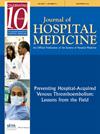Decision fatigue in hospital settings: A scoping review
Abstract
Background
“Decision Fatigue” (DF) describes the impaired ability to make decisions because of repeated acts of decision-making.
Objectives
We conducted a scoping review to describe DF in inpatient settings.
Methods
To be included, studies should have explored a clinical decision, included a mechanism to account for the order of decision making, and be published in English in or after the year 2000. Six databases were searched. Retrieved citations were screened and retained studies were reviewed against the inclusion criteria. References of included studies were manually searched, and forward citation searches were conducted to capture relevant sources.
Results
The search retrieved 12,781 citations, of which 41 were retained following screening. Following review, 16 studies met the inclusion criteria. Half were conference abstracts and none examined hospitalists. Emergency medicine and intensive care settings were the most frequently studied clinical environments (n = 13, 81%). All studies were observational. The most frequently examined decisions were about resource utilization (n = 8, 50%), however only half of these examined downstream clinical outcomes. Decision quality against prespecified standards was examined in four (25%) studies. Work environment and patient attributes were often described but not consistently accounted for in analyses. Clinician attributes were described in four (25%) investigations. Findings were inconsistent: both supporting and refuting DF's role in the outcome studied.
Conclusions
The role of clinician, patient, and work environment attributes in mediating DF is understudied. Similarly, the context surrounding the decision under study require further explication and when assessing resource use and decision quality, adjudication should be made against prespecified standards.


 求助内容:
求助内容: 应助结果提醒方式:
应助结果提醒方式:


